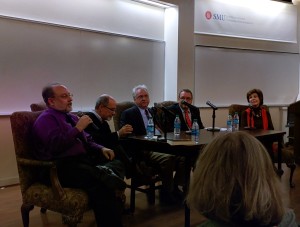
Science is a process by which reliable information is obtained by repeated use and assessment. In science, all claims are up for revision; however, absent better information when there is enough reliable information to make a decision it is usually considered wise to do so, even if future revisions (which one cannot predict) might cause adjustments to past decisions. This past week, the Dedman College Interdisciplinary Institute, on whose Faculty Advisory Board I serve, hosted a panel discussion [1] of four scientists moderated by a local public radio journalist. The event quickly became a microcosm of the very problem that the public has in understanding and using scientific information, and about public understanding of what it means to be a scientist. I’ve had a few days to process this event, and I want to share my personal observations and thoughts here.
The Dedman College Interdisciplinary Institute (DCII) at SMU is hosting a year of programming under the theme of “scientific literacy.” This is a very good thing. Too often, Universities and Colleges avoid this subject because it can be uncomfortable. At my own institution, plenty of wealthy local business-people made their money on the fossil-fuel energy industry; discussing the scientific understanding of human-induced climate change is often at odds with the values of such businesses and the people that support or operate those businesses. But Universities should not be spaces that are so safe that they mistakenly treat every single opinion as sacred. This is especially true when it comes to discourse on subjects where scientific information plays a critical role in directing the subject.
In a University or College setting, too often people mistake “academic freedom” for “everything goes.” This is a complete misunderstanding. Freedoms come with responsibilities. I have the right to speak my mind, but the flip side of this is that I also have the responsibility to defend my ideas with the best quality evidence. If someone presents far better evidence for the opposing set of viewpoints, then a responsible academic should alter their viewpoint. Too often, University campuses are treated as places where disagreeing with another person is seen as “offensive” or “mean.” Science, in particular, is not a democracy – it is, fundamentally, a tyranny of data where ideas live or die based on whether or not they offer the best and most useful explanation of the data. This means seemingly “good” ideas can die very quickly, discarded in favor of messier ones that work far better and create new knowledge in the process.
So I am very supportive of a “scientific literacy” year for my institution. I am proud that the DCII has taken the lead on this, because true interdisciplinarity takes advantage of the strengths of each person involved in the discourse, not requiring people to became experts at everything but rather using the expertise of the individuals to create a new whole that is more than the sum of its finely tuned parts. Science is such a place where such diversity of expertise is needed, and science literacy – which involves values, education, and science – even more so. I was thus pleased that we welcomed Naomi Oreskes to campus two weeks ago to discuss why science is worth trusting, and that we hosted four of our own excellent faculty in a panel this past week to discuss issues at the interface of science, science literacy, and the public.
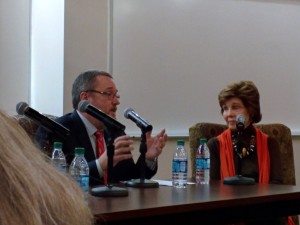
The panelists were Professors David Meltzer from Anthropology, Louis Jacobs from Earth Sciences, Randall Scalise from Physics, and John Wise from Biology. In each of these areas, the panelists are experts on issues related to the interface of science and society. For instance, Dr. Meltzer has expertise in human cultures and human evolution and thus can speak directly on issue of the social and religious controversy over teaching natural selection in public school biology classrooms. Dr. John Wise is an expert in cancers and their ability to adapt to chemotherapeutic agents; again, this is someone whose daily utilizes and fights natural selection in the laboratory in order to save human life. Dr. Jacobs is an expert on the role that climate plays in society and the factors that affect climate. He is thus perfect to discuss the values and political controversies about what to do in response to human-induced climate change. Dr. Scalise is a theoretical physicist who has taught for over 10 years a course in the introduction to the scientific method (one which I have also taught, on occasion, when Randy deserved a break!). He has delved into MANY issues that are non-controversial in the scientific community but which garner huge controversy in the public: the existence of alien visitations to Earth, ghosts, a “Bermuda Triangle,” Bigfoot, and of course the public controversies over alternative medicine systems, climate, and Christian creationism taught as science.
This is an excellent panel, already expert in many high-profile societally controversial issues. I was pretty excited that a local journalism celebrity, Lee Cullum [2] of KERA News, was going to moderate the panel. I settled in for a fun hour of deep talk from different perspectives about the difficult subject of science literary, the public, and the scientific process.
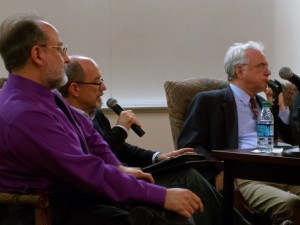
It began well. Each panelist was given 5-8 minutes to make a short introductory statement. Dr. Wise spoke about encountering a student in one of his classes who passed the course with flying colors but told him at the end that she didn’t believe a word of what he had taught her. He used this to juxtapose science with belief. Dr. Meltzer spoke about the factors that influence public understanding of science, and in particular highlighted the conflicting demands on media outlets that often make them weak on dealing with scientific issues. Dr. Jacobs spoke about climate and the misunderstanding of what it means that climate has changed in the past and what it means that it’s changing now, led by human activity. Dr. Scalise spoke about the scientific method course.
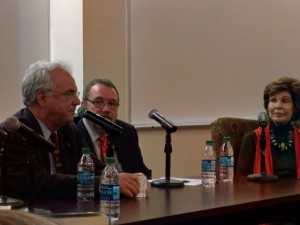
It was Lee Cullum’s turn at this point to lead the discussion. What happened for the next 40 minutes or so was an example of the way in which the public misuses and misunderstands science and scientists. Cullum kept starting off her questions to the panel with sweeping policy and values statements, doing exactly what is often the problem with the public: they mix values and science issues and consider all of that, together, to the be “scientific issue.” As an example, Cullum started one part of the panel discussion with a long statement about the recent changes in mammogram frequency guidelines. She stated that she believed that this change was more done by the Obama administration to save money on women’s health issues and protect the healthcare system from costs. She denied that the guideline changes were motivated by new and better scientific information. She stated that she believed this was an assault on women’s health.
What does a scientist do when the issue is handed to them as a values-laden conspiracy theory, with only the thinnest veneer of scientific information? These four panelists were faced with looking like complete women-hating jerks if they argued back at her. They were faced with making it look like there were just two sides to this issue, when in fact it’s both a complex scientific issue (how do you balance the risk of radiation and the effects of false positives or false negatives against the benefit of early detection of cancers?) and a complex values issue (there is a sense of an assault on women’s health in the United States right now, one that plays a major role in both political and religious discussions; individuals do have a right to make decisions for themselves regarding treatment and prevention, but how is that to be balanced with societal issues like risk and cost over large numbers of women?). Cullum managed to toss all of this into a blender, hit “Frappe,” and then pour a huge heaping glass of it onto the table in front of the panel. I believe she meant well, but her process was disastrous in helping the audience understand how to disentangle values from science when dealing with issues in society.
To their credit, the panelists (who were given just a minute or two to comment on this mess) tried to stay above the fray and above board. One of them noted that for women who have a clear family history of breast cancer or who possess the BRCA1 or BRCA2 genes (which are linked to a significantly increased risk of breast cancer), nothing has changed; they should continue to get yearly screenings. Others tried to note the balancing of risk and benefit in the remaining population of women whose risk is not yet clear by a reliable test, and for whom the doses of radiation from mammography may not provide a benefit. The evolution of knowledge over time, driven by the scientific process, was emphasized; guidelines for women and mammography were last established almost half a century ago, and we’ve learned a whole lot since then. The panelists managed to find a path through the clutter.
The other example I will give has to do with the rapid-fire shooting of random topics to panelists with no expertise in the issue. For instance, Cullum made a statement claiming that Coca Cola had recently been found to be funding a small group of scientists whose work emphasizes the role of sedentary life style over sugar intake in weight gain and healthy outcomes. As an aside, I know from studying this issue and from a personal experience consistent with the evidence that weight and health are complex issues and ALL causes must be addressed to change them. Cutting sugar is a great idea (I very rarely drink sugary soda any more); but adding exercise is ESSENTIAL. It’s not enough to change your calorie intake; you have to exercise 1 hour per day. Without both of those things, your weight is a lost cause.
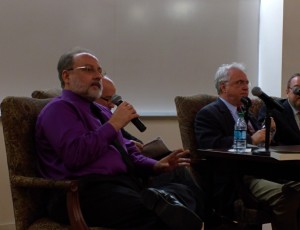
Cullum asked Dr. Scalise to comment on this… a physicist, with no professional expertise in weight loss or physical fitness! I found it funny that Cullum was sitting right next to a biologist and didn’t bring him into the conversation. This was typical of the style of her moderation, and an interesting window on how journalists misunderstand expertise and misuse experts.
To his credit, Dr. Scalise avoided wading into a discussion about something for which he had no knowledge (he stated outright that this was the first he had heard of this claim about Coca Cola). Instead, he turned to the audience and gave them some ideas about how to find reliable information about a subject for which they have no expert knowledge. This was good! He avoided extemporaneous exploration of the claim itself and instead told the audience how to go find reliable information for something that they’ve never heard about before. This was truly above board.
Cullum never lingered on a subject for too long. She tended to toss a question to a panelist and when they responded, even when another panelist wanted to add a comment, she would move the panel on to some other subject. This whole style seemed nuts to me, less “moderation” and more “dictation.” I would have expected a journalist without formal training in this area (science) to use her panelists more strategically, letting the issue dimensions be explored from various perspectives and letting the panelists engaged with each other and the audience – albeit in a moderated way.
To be sure, the evening could have gone a whole lot worse. It could have turned into some weird shouting match. This is likely what the public might have expected. In contrast, the panelists stayed above board and stuck to their areas of expertise. This, even though they were faced with rapid-fire issues prefaced with personal statements and opinions from the moderator, who herself has no formal training in any area of science and is not a science journalist. It became a microcosm for the kinds of problems that scientists face in communicating the process of establishing reliable information. Rather than being offered a forum for a deep discussion of a few salient issues, panelists were doused with short, varied, “gotcha”-style issues about which they had little personal knowledge and which often fell outside of their areas of expertise.
I believe that Cullum meant well in all of this, but inadvertently she demonstrated exactly the problem that journalists have in finding and using expertise. To their credit, the panelists managed to turn it back to how one would learn more about these issues and how science helps us change what we know over time, to make it better knowledge. That was worth it. I just hope they don’t shy away from doing such events again in the future. Society needs them, as it needs all scientists, to participate in these things from time to time.
[1] http://www.smu.edu/~/media/Site/Dedman/DCII/Faculty%20Panel%20Discussion%2011515.ashx?la=en


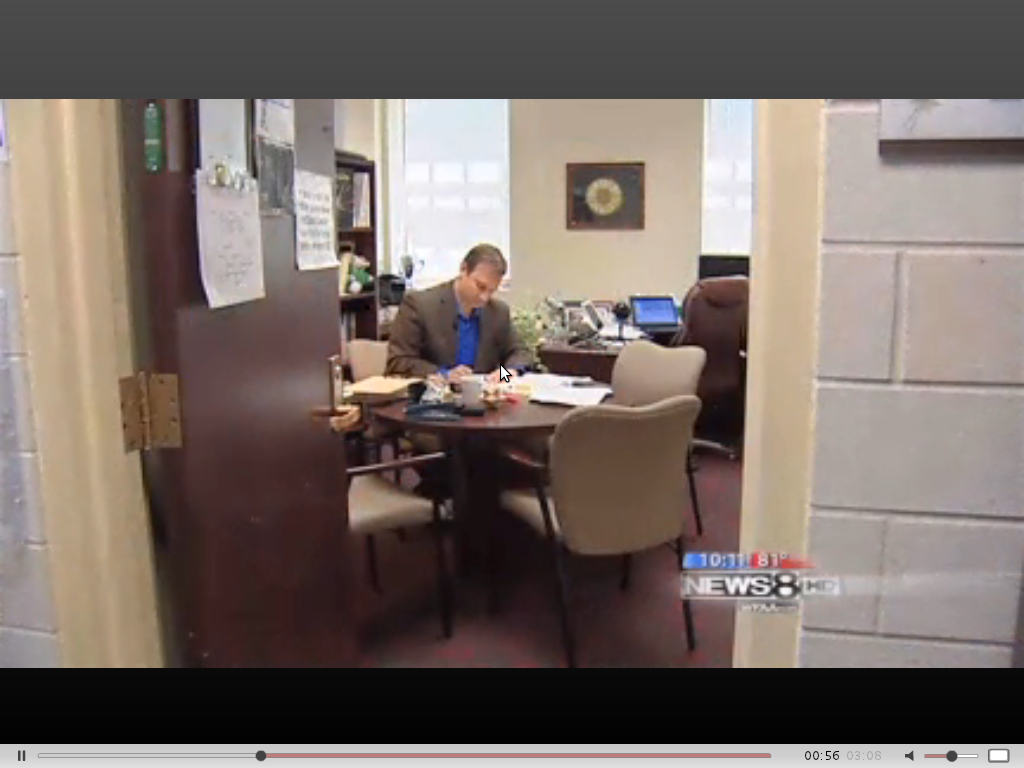
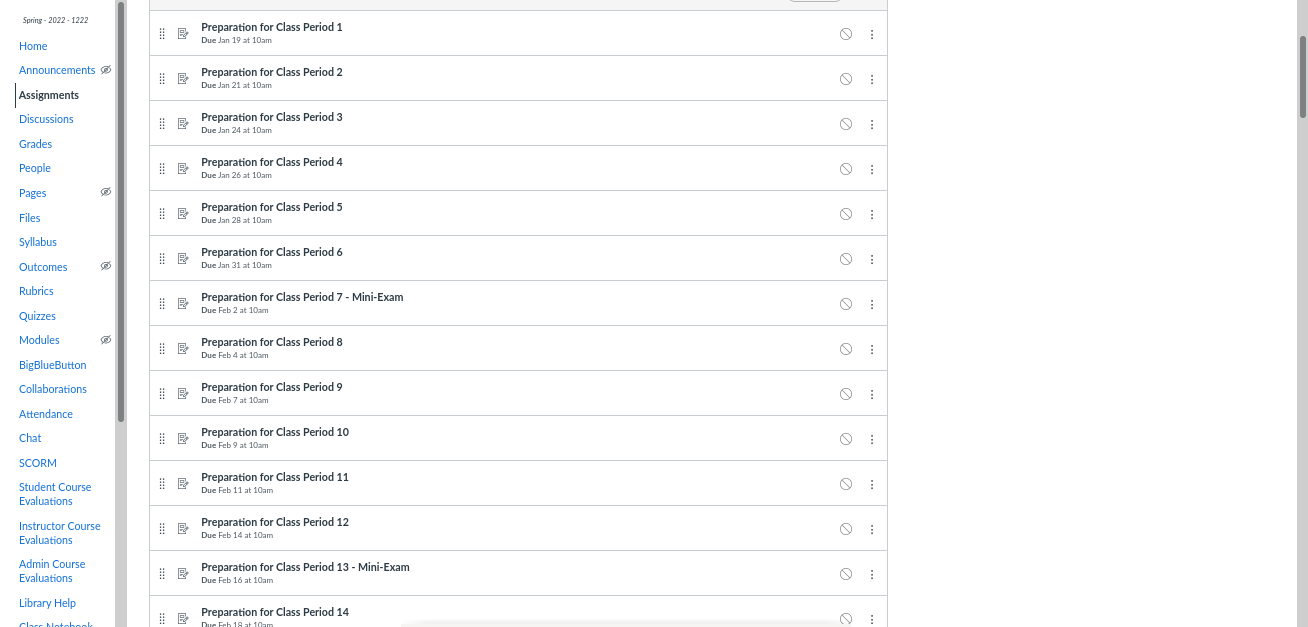

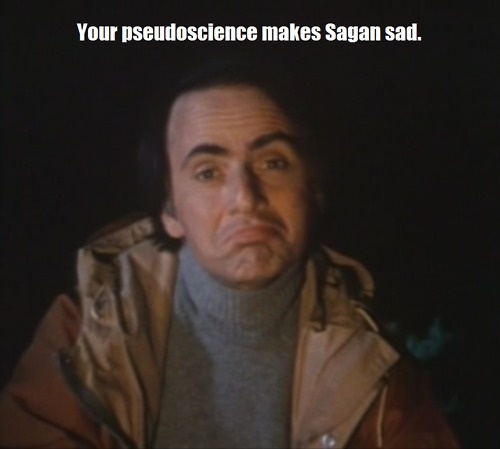
One thought on “Microcosm: when science and the public meet”
On Facebook, one of the panelists made an excellent point: the audience at this event was amazing. There were excellent questions and comments from them, and this enhanced the evening. It was a rare example of panel-audience engagement in a difficult subject. it wasn’t a love-fest… it was just a good conversation between panel and audience.